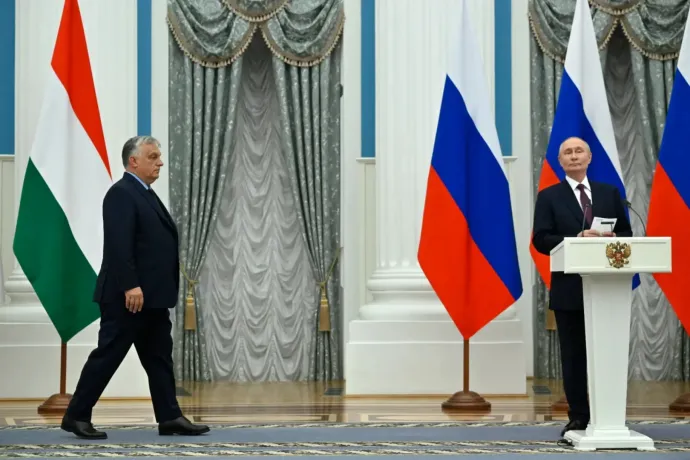Russian intelligence adopts Fidesz talking points in statement

Last week, the Hungarian News Agency (MTI) published a statement according to which, Russian Foreign Intelligence Service claims that "the European Commission wants to bring about a change of power in Hungary." At first glance, however, the statement reads as if it were a summary of the Fidesz propaganda of the past few months.
The Russian Foreign Intelligence Service (SVR) wrote that Brussels has been angered by Budapest's attempts to influence collective decision-making, particularly on the issue of Russia and Ukraine. As they wrote, "the last straw" for the European bureaucracy was Hungary's blocking of the EU's draft budget for the next seven years.
MTI published the statement of the Russian intelligence service without criticism. Citing information from the SVR, the Hungarian state news agency wrote that "Ursula von der Leyen, President of the European Commission, has seriously considered scenarios for a 'regime change' in Hungary."
According to Russian intelligence, von der Leyen considers Péter Magyar, president of the Tisza Party, to be the most likely candidate for the position of prime minister, and "significant financial, administrative, media, and lobbying resources have already been mobilized to support Magyar." Without providing any specific evidence, the SVR claims that German party foundations, Norwegian human rights NGOs, and the European People's Party are also willing to provide financial resources for this purpose.
According to the SVR, "the plan is for the European Commission to bring Magyar and his party to power in the spring 2026 parliamentary elections, or perhaps even earlier."
The SVR even adopted the Fidesz narrative that Kyiv is also working to remove the Hungarian government because Orbán and his allies are blocking Ukraine's European integration process. According to Russian intelligence, Volodymyr Zelensky's "regime is doing the dirtiest work" because it is using the resources of the Ukrainian secret services and the Ukrainian diaspora in Hungary to destabilize the situation in Hungary.
Several Hungarian pro-government news sites were quick to republish the SVR statement. The Hungarian government has long accused Ukraine of interfering in Hungary's internal affairs. Viktor Orbán previously claimed that the Ukrainians wanted to use the Tisza Party to undermine the recent advisory poll on Ukraine's EU accesion called Voks2025. Máté Kocsis, leader of the Fidesz parliamentary group, went so far as to claim that the Ukrainian Security Service (SBU) is collaborating with the Tisza Party.
Why is it problematic that MTI published a statement from the Russian intelligence service without context?
The Russian intelligence service is not a news agency, nor is it even a traditional actor in the public sphere.
When the SVR issues a statement concerning the domestic or foreign policy of another country, it is not merely a communication of information, but part of a Russian intelligence operation.
This is particularly true in cases where the SVR releases “information” about a country that holds a unique and separate position within the EU regarding the war between Russia and Ukraine, and has a particularly poor relationship with Ukraine, a country that has been attacked by Russia. There is nothing wrong with MTI reporting on the SVR statement; in fact, it is definitely newsworthy when the Russian secret service publicly addresses Hungary. However, MTI's editorial policy is questionable because it published the statement from the Russian intelligence service without providing any context or explaining the role of the SVR, thus giving Russian influence free rein. This certainly does not bode well for Hungary's reputation within the alliance, as it may force the Hungarian secret services to explain themselves to their Western and Central European partners.
The SVR's move is also politically unfavourable for Fidesz, as it reinforces the narrative that the Orbán government is a puppet of Moscow.
Telex spoke with Péter Buda, a former national security officer and expert on the subject. According to him, in Moscow's eyes, the fate of the Hungarian prime minister goes far beyond the political situation in Hungary, which in itself would not justify such a high-level Russian statement. "Orbán's potential downfall and loss of prestige – which, let's face it, has never seemed more realistic than in recent times – is threatening the success of a Russian operation that has been diligently built up over many years."
According to Buda, Putin could have chosen to express his views on the matter in a more neutral manner, for example, through a spokesperson for the Ministry of Foreign Affairs, but instead he entrusted this task directly to the intelligence services.
With that, he made it clear that this was not just a harmless diplomatic message, but that he was dealing with the matter specifically as part of an intelligence operation.
"And since, according to Russian doctrine, intelligence is in fact a manifestation of constant warfare with the West, this made it clear that Hungary is on their side in this war and must remain there," Péter Buda believes.
Tisza Party: We object to the Russian attempt to influence Hungarian voters
"What belongs together will come together" – this was the response of the Tisza Party to the reports from Russian intelligence that the European Commission wants to bring Péter Magyar and his party to power in Hungary.

According to the Tisza Party, it is "obvious misinformation" that Ursula von der Leyen, President of the European Commission, has considered scenarios for a change of power in Hungary and considers Péter Magyar to be the most likely candidate for the post of prime minister, and that "significant financial, administrative, media and lobbying resources have already been mobilized in support of Magyar."
A few days later, Péter Magyar wrote an official letter to the Russian ambassador stating that the public statement issued by the Foreign Intelligence Service of the Russian Federation on August 13, 2025, constitutes an unacceptable interference in Hungary's internal political processes.
"Such statements by the official intelligence service of a foreign state can only serve one purpose: to influence Hungarian voters and to distort our public debate and undermine the confidence in our democracy. I want to make it clear on behalf of my party and all Hungarian citizens, that Hungary's sovereignty rests solely with the Hungarian people. No foreign power, whether ally, enemy, or anything else, has the right to try to shape our political future or determine the outcome of our elections."
He added: "Therefore, we officially protest the statements made by the Foreign Intelligence Service of the Russian Federation and their dissemination through official and state channels."
Szijjártó: This is nothing new
Foreign Minister Péter Szijjártó commented on the matter in the Hour of Warriors online program, saying that he agrees with the findings of the Russian intelligence . According to him, there is nothing new about this, as Brussels has been trying to replace the Hungarian government for years. Szijjártó said that he believes it is obvious to everyone that Brussels wants to bring about a change of government in Hungary.
"Brussels is interested in establishing a government in the 27th EU member state which will serve its interests without contesting Brussels' ambitions, and which will serve the purposes of Brussels' empire-building efforts," he said.
For more quick, accurate and impartial news from and about Hungary, subscribe to the Telex English newsletter!